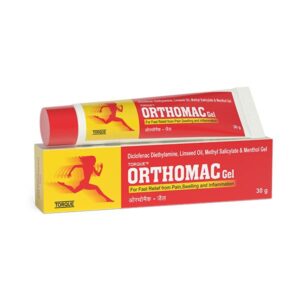LINSEED OIL + DICLOFENAC DIETHYLAMINE + METHYL SALICYLATE AND MENTHOL
Linseed Oil: Linseed oil, also known as flaxseed oil, is derived from the seeds of the Linum usitatissimum plant. It has been used for centuries both as a dietary supplement and as a natural remedy for various health conditions.
The primary use of linseed oil is as a source of essential fatty acids, particularly alpha-linolenic acid (ALA), which is an omega-3 fatty acid. Omega-3 fatty acids are important for maintaining overall health and have been found to reduce inflammation, promote heart health, and support brain function. Linseed oil is commonly used to supplement the diet of individuals who are not obtaining enough omega-3 fatty acids from their regular diet.
The mechanism of action of linseed oil is mainly attributed to its high content of ALA. Once ingested, ALA is converted into eicosapentaenoic acid (EPA) and docosahexaenoic acid (DHA) in the body, which are the active forms of omega-3 fatty acids. These fatty acids have anti-inflammatory properties and are involved in various physiological processes.
The recommended dose of linseed oil varies depending on the individual’s age, health condition, and dietary needs. Generally, it is recommended to take 1-2 tablespoons (15-30 mL) of linseed oil per day. It can be consumed directly or added to foods such as salads, smoothies, or yogurt.
While linseed oil is generally considered safe, some individuals may experience side effects. These can include gastrointestinal symptoms such as bloating, gas, diarrhea, or stomach discomfort. Allergic reactions are rare but possible in some individuals who are sensitive to flaxseeds or other components of the oil.
Additionally, it’s important to note that linseed oil can have a blood-thinning effect. Therefore, individuals taking blood-thinning medications or those preparing for surgery should consult with their healthcare provider before using linseed oil.
Overall, linseed oil is a natural source of omega-3 fatty acids and can be used to supplement the diet for various health benefits. As with any dietary supplement, it’s important to follow the recommended dose and consult with a healthcare provider if you have any concerns or specific health conditions.
Diclofenac Diethylamine: Diclofenac Diethylamine is a non-steroidal anti-inflammatory drug (NSAID) that is used to relieve pain, inflammation, and swelling. It belongs to a class of drugs called diclofenac sodium gel, which is topically applied to the skin.
The mechanism of action of Diclofenac Diethylamine involves inhibiting the production of prostaglandins, which are chemical messengers in the body that cause pain and inflammation. By reducing the levels of these prostaglandins, Diclofenac Diethylamine helps to alleviate pain and reduce swelling.
The drug is primarily used to treat conditions such as osteoarthritis, rheumatoid arthritis, and ankylosing spondylitis. It can also be used to relieve pain from sprains, strains, and sports injuries.
The recommended dose of Diclofenac Diethylamine is to apply a thin layer of the gel to the affected area 3 to 4 times daily, or as directed by a healthcare professional. The gel should be gently massaged into the skin until it is completely absorbed. The dose may vary depending on the severity of the condition and the individual patient’s response to the medication.
As with any medication, Diclofenac Diethylamine may cause some side effects. Common side effects include skin irritation, redness, itching, and dryness at the application site. These side effects are usually mild and temporary. However, if any severe allergic reactions or serious skin reactions occur, such as rash, hives, or difficulty breathing, medical attention should be sought immediately.
It is important to note that Diclofenac Diethylamine is for external use only and should not be ingested or applied to open wounds or damaged skin. It should also be used with caution in individuals with a history of allergic reactions to NSAIDs or those with known liver or kidney problems.
In conclusion, Diclofenac Diethylamine is a topical gel used to relieve pain and inflammation associated with various conditions. By inhibiting the production of certain chemical messengers in the body, it helps to reduce pain and swelling. The gel is applied to the affected area several times a day, but care should be taken to avoid side effects such as skin irritation.
Methyl Salicylate And Menthol: Methyl Salicylate and Menthol is a combination medication used to relieve minor aches and pains of muscles and joints. It is commonly found in topical analgesic products such as creams, gels, and patches.
Methyl Salicylate is a derivative of salicylic acid, which has both analgesic (pain-relieving) and anti-inflammatory properties. It works by inhibiting the production of prostaglandins, substances in the body that contribute to pain and inflammation.
Menthol is a compound derived from mint oils that produces a cooling sensation when applied to the skin. It stimulates the cold receptors on the skin, providing temporary relief from pain and inflammation.
The dose and application of Methyl Salicylate and Menthol depend on the product being used. Follow the instructions provided on the packaging or as directed by your healthcare professional. It is important to avoid applying excessive amounts or using it on broken or irritated skin.
Common side effects of Methyl Salicylate and Menthol include skin irritation, redness, or allergic reactions. Some individuals may also experience a warming or burning sensation upon application. If any severe or persistent side effects occur, it is important to discontinue use and consult a healthcare professional.
As with any medication, it is recommended to consult a healthcare professional before using Methyl Salicylate and Menthol, especially if you have any underlying medical conditions or are taking other medications.


